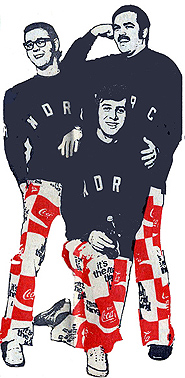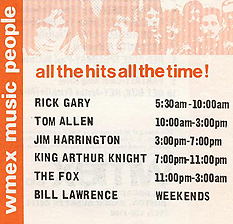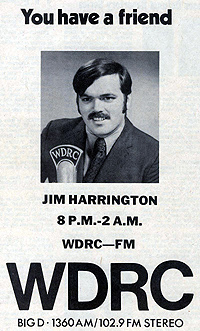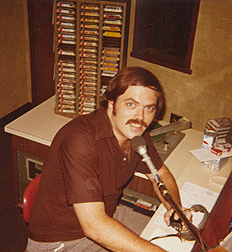
©
2007-2025
Man From Mars Productions
|
Jim
Harrington
|
 |
|
 October 1971 - (l-r:) WDRC's Jack Miller, Bob Craig & Jim Harrington pose in their infamous Coke pants |
Q: In May 1971 the Big D personalities appeared in print wearing those gaudy Coca Cola bell-bottoms. What do you suppose a pair of those would fetch now on eBay? A: Oh my....what a memory! I remember the photo session in the DRC lounge. We thought we looked 'cool', but looking back we probably resembled a circus act waiting to go on the Ed Sullivan Show. I can't imagine anyone wanting to bid on those things...and I think I had mine for a few years . They never fit me correctly and, of course, where would you wear them? They didn't go with anything. But then again, nothing went with anything back in the seventies. Q: By February 1972 you were doing afternoon drive on FM, opposite The Prince on AM. Were you happy to just have a job or were you eyeing a particular shift ambition? A: I was still a novice in the business. I had just gotten married and life was an adventure. Of course I wanted to grow in the business but I was happy to be working days and doing that shift. Dick McDonough was (and still is) a wonderful talent. I had known him since his days at WKBR in Manchester. I was working across from an old friend, making a good living, happy and relatively satisfied. Q: In November 1972 I believe you did the inaugural honors when the Big D Mobile Studio was unveiled. I think it was at the Lynch Toyota "Put Your Hands on A Toyota and Never Let Go" promotion in Manchester. A: Wayne Mulligan did a great job building that mobile studio. I remember that he worked his tail off putting that showplace together. It was state of the art for its time. I felt like a million dollars when I was broadcasting from that trailer. And I believe you're correct about the inaugural. That promotion was another Charlie Parker masterpiece. In all of my years in radio, that stands out as the most creative...most imaginative. It was an amazing contest conceived by an amazing guy. |
 Jim Harrington in 1974; dig the groovy threads! |
Q: Your Hartford days must have been pretty good because, among other things, you met your wife there. Your courtship with Jean, and the arrival of your first daughter, were pretty well documented on the air. A: To this day...I still love the Hartford area. It was a starting place for so many wonderful things in my life. Many of my friends, from those days, have remained life long friends. Both of my children were born in Manchester Memorial Hospital; my first apartment was in West Willington and my first house was on Lake Street in Vernon. I could live in that area again tomorrow and feel very much at home...and I haven't lived there since 1975. Q: What was the story behind your recording "I'm Henry The Eighth I Am?" A: I was goofing off in the production studio...I believe on a Sunday morning...and one thing led to another. At the time you needed an engineer to run the production studio board so it might have been Dave Overson. If I'm wrong and it was Dan Siemasko or Brian Morris...my apologies...but it was totally impromptu. I still have it in a box somewhere...then again I still have a lot of things in a box somewhere. :) |
 |
A: No...actually I think Bill Rock was programming WMEX then (there's another nice guy in the biz). I was commuting from Vernon to Boston every day and the routine was killing me. King Arthur Knight and I were friendly but I don't believe he had anything to do with my getting that job. It was a decent aircheck and an arbitrary decision by Bill Rock....I believe. (It's been soooo long). Q: What happened at WIMEX...why didn't it work out? And were Charlie and Dick Korsen receptive to your return? A:Again...it was the commute that did me in. I just couldn't handle it. And WMEX was in the Combat Zone in Boston (I think it's been replaced by the Big Dig); not a welcoming and secure place to work. My last shift on the air at WMEX, the guy in the liquor store across the street was robbed and pistol whipped...it was a sign that my leaving was the right thing. Of course, I would later work again with Roy Fox, who did a nightly talk show on WMEX and went on to KDKA. |
|
|
A: Maybe it was my youth and inexperience but I wasn't too concerned about that situation. Of course I remember the meetings with the union leaders from Boston and the discontent at the station but, possibly because of my youthful naivety, I was fairly certain that everything would work out...and fortunately for me and everyone else there...it did. I decided to leave because I felt that I had reached the salary ceiling at the station. Korsen was notoriously tight. I had a wife and two little children and I was starting to 'grow up', I needed to make more money. |

